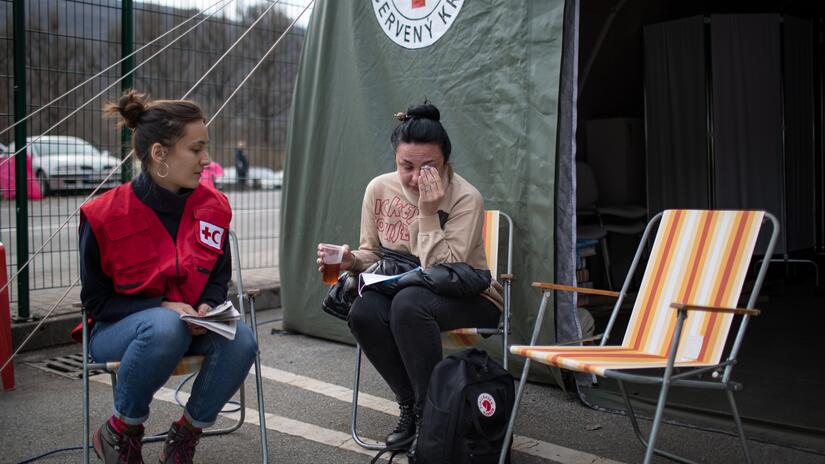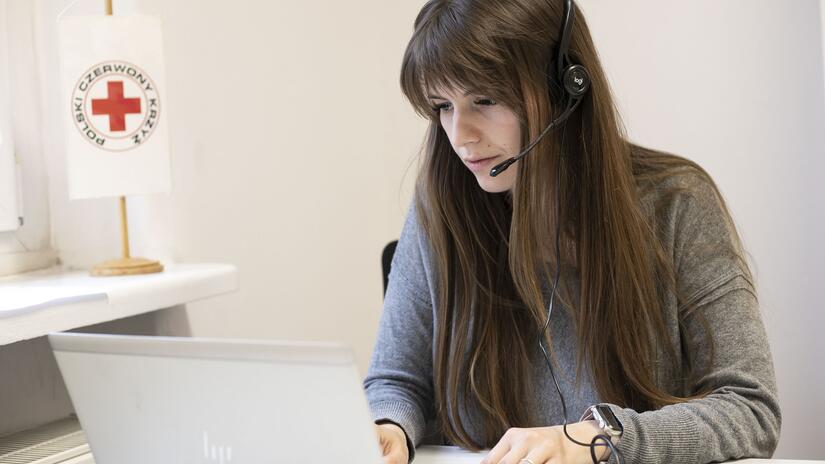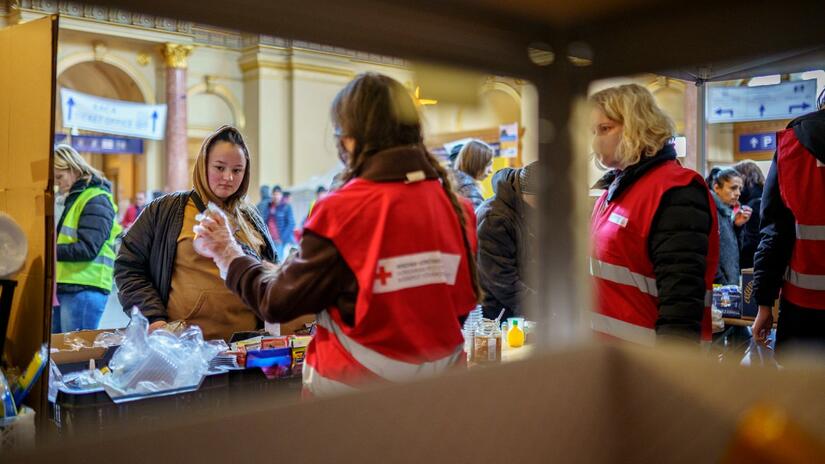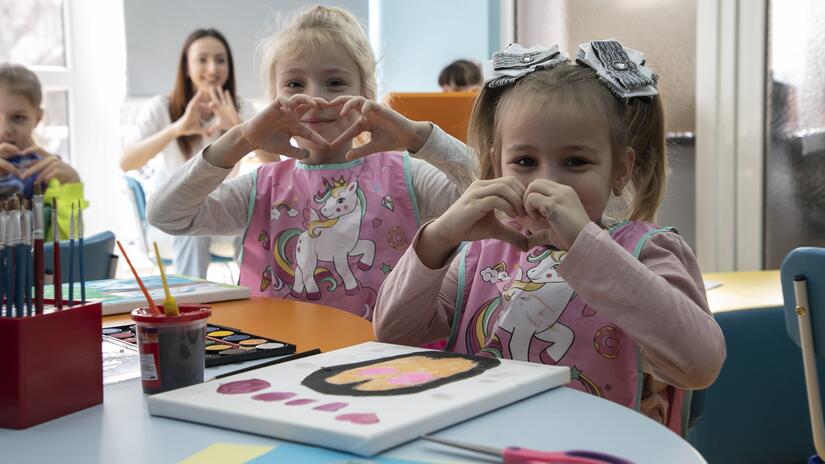EU4Health and the IFRC
Adopted in response to the COVID-19 pandemic, the European Commission's EU4Health programme seeks to boost pandemic preparedness and build stronger, more resilient and more accessible health systems. A key part of the EU4Health programme includes an historic and ambitious partnership with the IFRC to provide psychological first aid and mental health services to people throughout Europe who have been impacted by the conflict in Ukraine.
Healing the invisible scars

At the Slovak border with Ukraine, a Ukrainian refugee named Iryna gets some comfort from an IFRC delegate at a Slovak Red Cross post set up to assist refugees with first-aid, psychosocial support and a variety of other critical services for families fleeing conflict.
Photo: IFRC
The project takes many shapes.
Just across the Ukrainian border with Slovakia, a Ukrainian woman named Iryna speaks with an IFRC delegate about how conflict has turned her life upside down.
In Poland, trained Red Cross volunteers at a special mental health hotline who speaks Ukrainian talk to Ukrainian refugees who need someone to talk to — someone to share their burdens.
And in Ukraine, Red Cross volunteers lead children through art classes and other fun activities to take their minds off of the conflict and bring some sense of normalcy to their lives.
These are just a few examples of the many ways the IFRC and 24 European Red Cross National Societies are addressing the mental health needs of people impacted by the Ukraine conflict, thanks to support from the EU4Health programme, a cornerstone project of the European Commission’s Directorate-General for Health and Food Safety (DG SANTE).
An historic collaboration on mental health during crisis

Christina is part of a team of operators at the Polish Red Cross Infoline in Warsaw who respond to an average of 300 calls per week, providing referrals to medical, mental health and administrative services. “Sometimes people who call are so stressed that they cannot stop crying,” says Christina, who is also from Ukraine. “We’ve been trained to talk to them in a way that helps reduce their stress. When they receive the information they need, they can finally relax.”
Photo: IFRC
This significant partnership between DG SANTE and the IFRC stands as one of the largest responses to mental health challenges in emergencies ever implemented by the Red Cross and Red Crescent family.
The project connects people with mental health professionals and volunteers from the Red Cross, who offer mental health and psychosocial support services to hundreds of thousands of people from Ukraine.
Support is offered in Ukrainian and other languages through various platforms, including helplines, mobile outreach and in-person group activities. Materials on psychosocial support in several languages are also distributed.
The collaboration began in May 2022, only months after the escalation of hostilities in Ukraine. With the support of DG SANTE, the IFRC joined with the Ukrainian Red Cross, the IFRC Psychosocial Centre and 25 National Red Cross Societies in the European Union/European Economic Area to develop a wide-ranging approach to breaking stigmas about mental health and to directly address the psychosocial needs of Ukrainians throughout Europe.
Why such a significant response?

A woman fleeing conflict in Ukraine speaks to Hungarian Red Cross volunteers at a Humanitarian Service Point they'd set up in Keleti train station to welcome people arriving from Ukraine and provide support.
Photo: Hungarian Red Cross
Since the start of the conflict in Ukraine, more than 6 million people have fled to other countries, and another 3.7 million are estimated to be internally displaced, facing distressing situations that have left them with trauma and loss.
According to the WHO, one-in-five people are affected by mental health disorders in post-conflict settings. If left without treatment and adequate support, people from Ukraine face long-lasting effects that could harm themselves, their families and communities.
The name of the collaboration sums up the project goal perfectly: Provision of quality and timely psychological first aid to people affected by Ukraine crisis in impacted countries. To do that, Red Cross and Red Crescent staff and volunteers have been on the ground, in Ukraine and neighbouring countries, addressing this massive need for mental health and psychosocial support.
What has this collaboration accomplished so far?

Children make the heart sign with their hands during an art therapy session at the Bulgarian Red Cross branch in Plovdiv as part of the EU4Health project.
Photo: IFRC
The support from EU4Health has allowed this collaborative project to scale up services in countries throughout Europe. See here some of the significant milestones:
• More than 11,450 health professionals and volunteers have been trained in mental health and psychosocial support.
• More than 1,130 Ukrainian/Russian-speaking health professionals mobilized and trained in mental health and psychosocial support.
• More than 60 helplines and service platforms expanded with mental health and psychosocial support services.
• More than 210,000 people, including Ukrainian displaced persons, were supported through helplines and service platforms.
• More than 10,360 staff and volunteers receiving mental health and psychosocial support.
• More than 940 coordination and collaboration meetings held with relevant partners.
A look at IFRC mental health efforts across Europe
Latest mental health related articles
Sudan: 'the most difficult year' after outbreak of conflict
Sudan: 'the most difficult year' after outbreak of conflict
A sense of ‘futurelessness’: new data shows severity of mental health challenges for people from Ukraine
A sense of ‘futurelessness’: new data shows severity of mental health challenges for people from Ukraine
Ukraine: Helping people get back on their feet after severe injury
Ukraine: Helping people get back on their feet after severe injury
Post earthquake, Red Cross China helps people heal and rebuild
Post earthquake, Red Cross China helps people heal and rebuild
This contents of this project are the sole responsibility of IFRC and do not necessarily reflect the views of the European Union.

